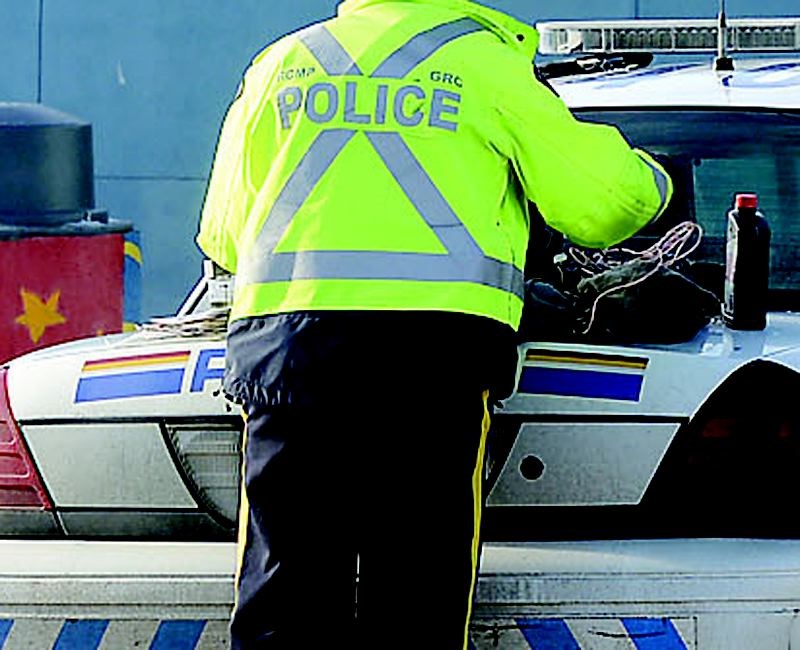A young Prince George man faces anything from a conditional discharge to time behind bars for impersonating a police officer and bilking his employer out of nearly $5,000 worth of merchandise.
Raafay Shehzad, 18, caused a stir last spring when he used police emergency lights he purchased online and attached to the dash in his vehicle to pull over drivers. Shehzad successfully extorted cash from two of them, prompting Prince George RCMP to issue a warning advising drivers that police never have a reason to ask for money from a member of the public.
At about the same time, Shehzad was also ringing through high-end merchandise at London Drugs, where he had been working for a short time, even though it had not been paid for, and then giving the items to his friends. He was also ringing items through as returned and giving his friends the cash. The cameras, phones, headphones and other times proven to have gone missing added up to $4,850.
Arrested in early April, Shehzad pleaded guilty to five offences from the two separate cases and was the subject of a sentencing hearing Monday in Prince George provincial court.
A UNBC student, where he is working towards entry into medical school, Shehzad was described Monday as an "exceptional young man who has caused an exceptional amount of chaos in our community over a short period of time."
Notwithstanding his accomplishments, which include extensive volunteering and high scholastic achievement, and a lack of a criminal record, Crown prosecutor Geoffrey McDonald said Shehzad acts of "spectacular dishonesty, deceit and poor judgment," warrant three months in jail followed by two years probation.
"This behaviour must be denounced, it cannot be allowed, particularly the impersonation of a police officer," said McDonald, who suggested the jail term could be served during the summer break from UNBC.
Posing as an undercover officer, Shehzad convinced two drivers to hand over $70 in total. One had recently got his license back and, although he didn't believe he was speeding, he quickly paid Shehzad $20. The other was a high school student and both had Ns on the backs of their vehicles.
"Police carry a very special role in our society, they keep us safe and when someone impersonates them for their personal gain, they put all of us at risk," McDonald said. "This can only be denounced, I submit, by jail."
Defence counsel Jason LeBlond argued for a conditional discharge with a probationary period featuring strict conditions.
Shezhad committed the crimes less than a month after he turned 18 years old and to his credit, the court was told, he not only confessed to the crimes but worked to retrieve the items stolen from London Drugs. He also returned the $50 he extorted from one driver.
LeBlond said there was a "certain culture" at London Drugs of employees committing the frauds when Shezhad started working there. In some ways, Shehzad was "groomed by the group that 'you can be with us or you can be against us,'" and subsequently "made some very bad decisions."
As for pretending to be a police officer, LeBlond described Shehzad's actions as "escalating, thrill-seeking behaviour" that began with flashing the lights to pull a car over and then scurrying away, to getting out and warning the driver and, at its peak, demanding money.
There were others in the vehicle Shehzad was driving, LeBlond added.
"It almost becomes an escalating dare from a number of young university students to see how far they can take this and to even initiate this was going too far but it just keeps going beyond and beyond," LeBlond said.
Shehzad's parents were completely unaware of what he was up to and were shocked when police showed up at their door, LeBlond said. Shezhad had intended to simply put the lights up in his room but when they arrived, he and his friends thought they looked convincing, "and it just went downhill from there."
LeBlond submitted that a conditional discharge with two years house arrest is sufficient to send a message. If a conditional sentence, where the jail term is served at home, is issued, LeBlond said Shehzad would have to wait five years from the end of the term to apply for a pardon so he could go on to medical school.
Shehzad's actions were "extremely out of character," LeBlond said.
When given a chance to address the court, Shehzad apologized for his actions.
Provincial Court Judge Victor Galbraith reserved a decision until next week. A specific date was still to be set Monday.


